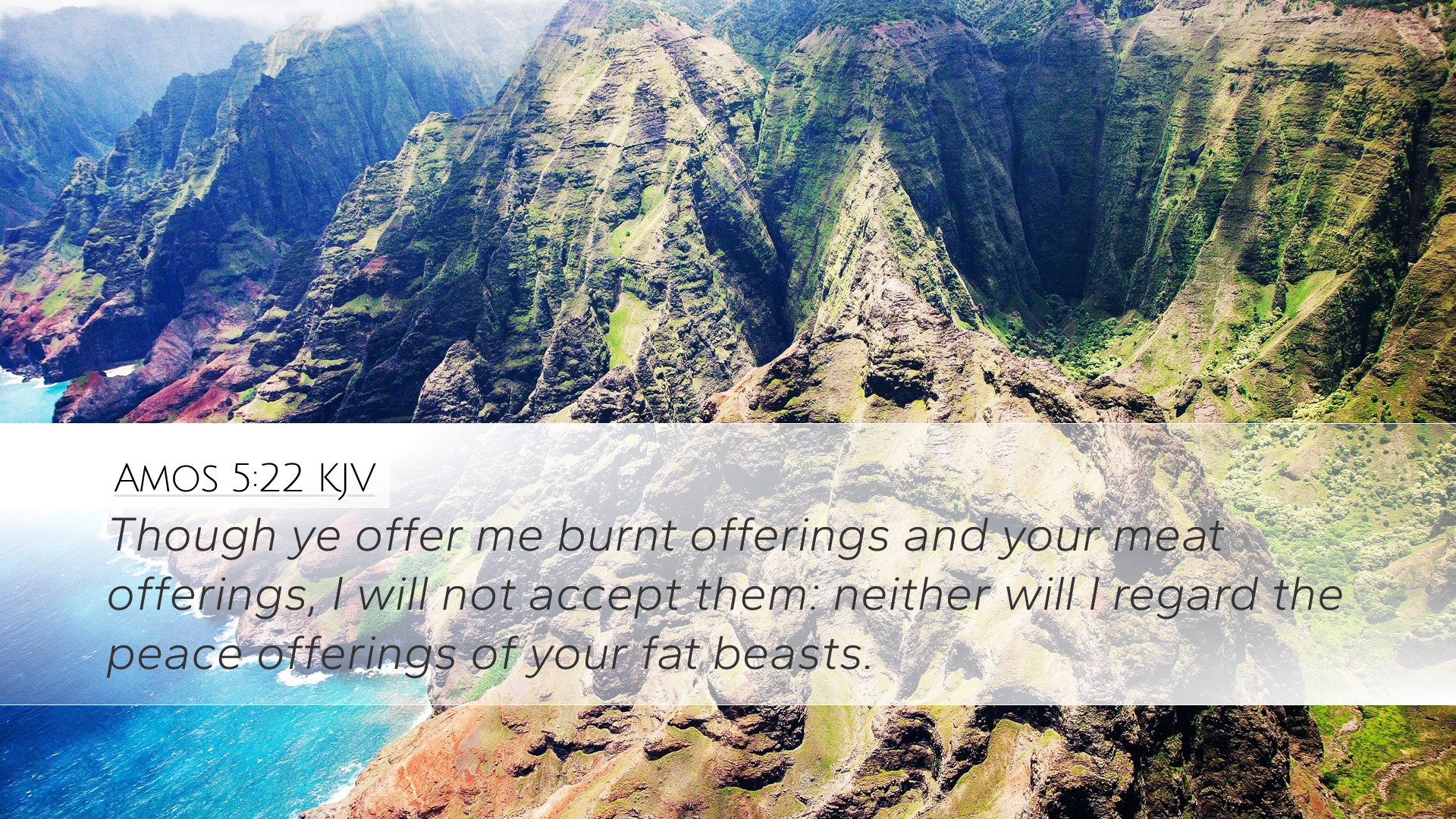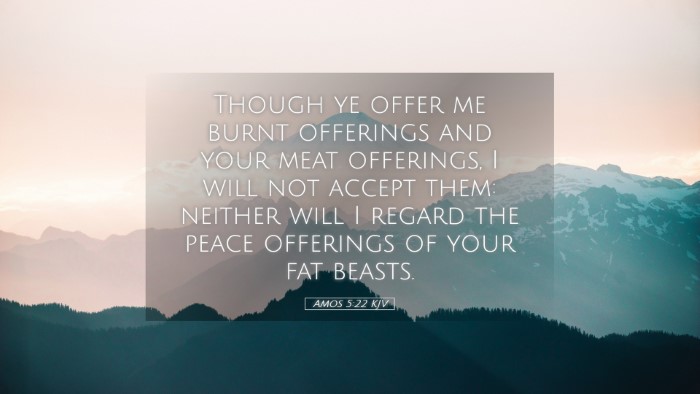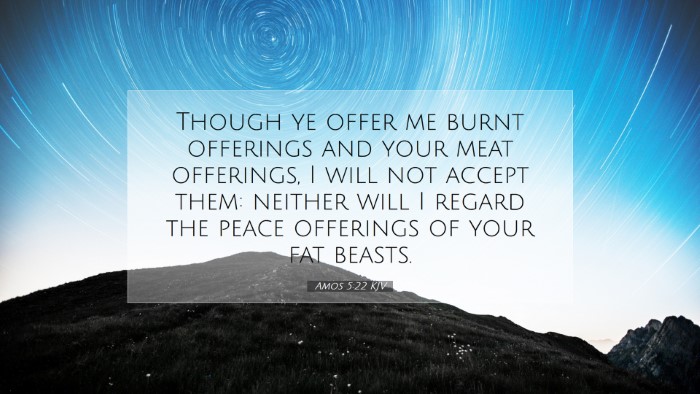Old Testament
Genesis Exodus Leviticus Numbers Deuteronomy Joshua Judges Ruth 1 Samuel 2 Samuel 1 Kings 2 Kings 1 Chronicles 2 Chronicles Ezra Nehemiah Esther Job Psalms Proverbs Ecclesiastes Song of Solomon Isaiah Jeremiah Lamentations Ezekiel Daniel Hosea Joel Amos Obadiah Jonah Micah Nahum Habakkuk Zephaniah Haggai Zechariah MalachiAmos 5:22
Amos 5:22 KJV
Though ye offer me burnt offerings and your meat offerings, I will not accept them: neither will I regard the peace offerings of your fat beasts.
Amos 5:22 Bible Commentary
Amos 5:22 Commentary
Verse Context: Amos 5:22 reads, "Though ye offer me burnt offerings and your meat offerings, I will not accept them: neither will I regard the peace offerings of your fat beasts." This verse encapsulates the central message of the prophet Amos, emphasizing the inadequacy of ritualistic worship devoid of genuine obedience and moral conduct.
Introduction
The book of Amos serves as a prophetic warning to Israel during a time of relative peace and prosperity. However, the nation's spiritual condition was deteriorating, marked by hypocrisy and social injustice. In Amos 5:22, the prophet confronts the people about their misguided worship practices, highlighting the disconnect between outward religious ceremonies and the inner morality required by God.
Public Domain Commentary Insights
Matthew Henry's Commentary
Matthew Henry explains that the offerings mentioned in this verse were essential to the Jewish faith, yet God viewed them as empty when offered without true devotion. He remarks that “God will not accept the services of those whose hearts are not right with Him.” Henry emphasizes that God desires the heart's thorough dedication over ceremonial fidelity. The repetitive nature of these sacrifices did not align with godly righteousness, and this misalignment prompted divine rejection.
Key Points from Henry:
- The Nature of Offerings: Henry notes that the burnt offerings and meat offerings were lawful and instituted by God but were rendered useless when the offerers maintained sinful lives.
- Divine Discontent: God’s refusal of these offerings symbolizes His displeasure with superficial worship. Henry argues that such rejection serves as a call to deeper, more authentic engagement with God.
- Call for Righteousness: The essence of Henry's interpretation propounds that heartfelt repentance and righteousness are prerequisites for acceptable worship.
Albert Barnes' Notes on the Bible
Albert Barnes provides an intricate analysis of the context in which Amos proclaims this message. He indicates that the Israelites had become complacent, increasingly relying on their rituals as a means to placate God without adhering to His moral commands. Barnes shares that this verse reflects God's standpoint that mere sacrifices do not suffice to curry His favor if the people live unrighteously.
Insights from Barnes:
- Worship as Relationship: Barnes elucidates the idea that God desires a relationship rooted in justice, mercy, and truth rather than a transactional form of worship represented by sacrifices.
- Critique of Ritualism: He critiques the notion that rituals alone can cover for sin, emphasizing that God is primarily after sincerity and ethical conduct.
- Historical Reflection: Barnes contextualizes Amos’s message historically, relating it to societal issues of his time, thereby establishing that the principles extend beyond ancient Israel to contemporary society.
Adam Clarke's Commentary
Adam Clarke focuses on the theological implications of God rejecting the offerings of Israel. He posits that such rejection signifies God’s demand for authenticity and the internal transformation of the worshippers. Clarke articulates that no amount of ritual can substitute for true piety and that Israel's sins incapacitated their religious observance.
Core Reflections from Clarke:
- Moral Incompatibility: Clarke speaks to the incompatibility between sinful lifestyles and acceptable worship, asserting that moral failings hinder the efficacy of religious rituals.
- Call to Action: He calls for an introspective examination where worshippers must assess their lives, purging all iniquity to present themselves as living sacrifices to God.
- Divine Perspective: Clarke highlights the divine perspective that views insincere acts of worship as an affront to His holiness.
Theological Implications
Amos 5:22 carries profound theological implications for both ancient and modern believers. The verse speaks to the heart of worship practices, inviting pastors, theologians, and students of the Bible to consider the weight of sincerity in their faith. It reminds the community that outward expressions of worship, while valuable, must always be accompanied by ethical living and the pursuit of holiness.
Conclusion
In conclusion, Amos 5:22 stands as a vital reminder of God’s expectations for His people, rejecting mere external compliance in favor of a relationship characterized by righteousness, justice, and love. As believers engage with this passage, they are encouraged to reflect on their practices and ensure alignment of both heart and action with God's divine will.


